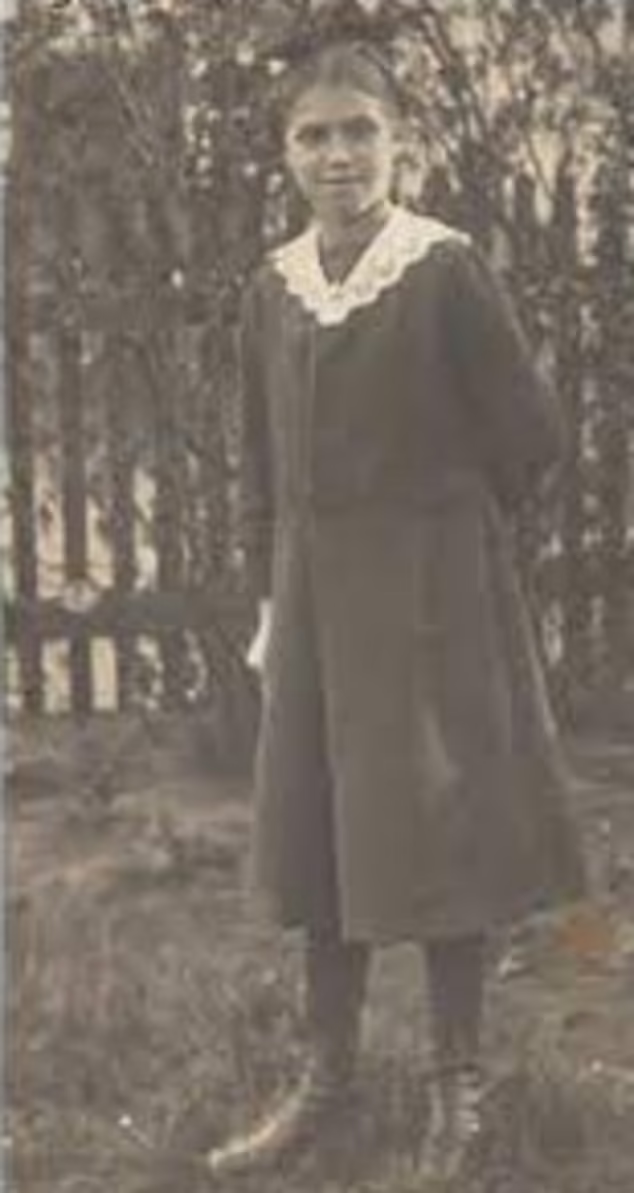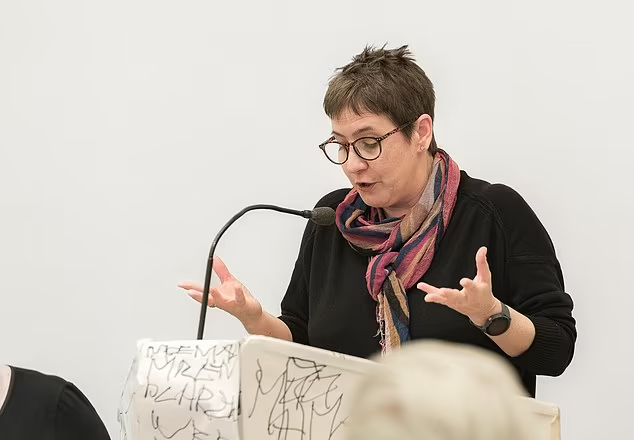A young woman with dreamy eyes, smartly dressed from her lace collar down, stares slightly away from the camera, as she stands in front of a picket fence. This is — or rather was — Ivy Angerer: one of many thousands of people with disabilities or mental health problems murdered by the Nazis between 1939 and 1941 as part of a medical programme known as ‘Aktion T4’.
This euthanasia scheme was organised under the auspices of the Reich Committee for the Scientific Registering of Serious Hereditary Congenital Illnesses.
What makes Ivy unusual is that she was born in this country (in 1911 at Hermitage Cottage, Broughty Ferry, near Dundee). And we know this largely because of research conducted over many years by Helen Atherton, 49, a registered nurse for people with learning disabilities, who is now a lecturer in the School of Healthcare at the University of Leeds.
Ivy Angerer: one of many thousands of people with disabilities or mental health problems murdered by the Nazis between 1939 and 1941 as part of a medical programme known as ‘Aktion T4’
That research has uncovered the details of 12 other British-born people who met their fate in the same way. Like Ivy, they were all from German or Austrian immigrant families, who later returned to what became the Reich — largely because of anti-German feelings here or the threat of internment as ‘enemy aliens’ during World War The biographies and images of all these British-born victims are at the heart of an exhibition that opened last week at the London Metropolitan Archives, and will then travel to other venues across the country. I was invited to the launch, at which Helen spoke, alongside Dr Paul Weindling, the leading British historian in this field (who has written numerous books, including From Clinic To Concentration Camp).
The exhibition is called ‘Finding Ivy: A Life Worthy Of Life’. Its title is a reference to the term used in Germany by the medical advocates of euthanasia (long before the Nazi government began Aktion T-4) for people such as Ivy, ‘Lebensunwertes Leben’ — lives unworthy of life.
She had what would now be termed a congenital disability, and had been sent in 1931 to the Am Steinhof psychiatric hospital in Vienna, where she was categorised as ‘a high-grade imbecile’ and worked in the laundry.
Nine years later, after Austria had become part of the Reich, Ivy, along with many others, was taken to a killing centre in Hartheim, accompanied by nurses in special grey buses. The passengers were told that they were being transferred to another clinic, and would be required to have a shower on arrival. These were the same as the ‘showers’ later used to murder millions of Jews: disguised gas chambers.
Ivy’s cause of death (at 29) was registered as ‘liver atrophy’. Doctors would invariably fabricate such certificates. Although it was part of a coherent eugenic programme, the authorities, naturally, didn’t want parents to know their children had been murdered.
Indeed, Aktion-T4 was suspended in 1941 after the Catholic Bishop Clemens Von Galen courageously denounced it from his pulpit in Munster. Many of the clinicians involved then switched their skills to Auschwitz and other extermination camps.
But this was not the death of medically sanctioned eugenics. Echoes of it persist today, here, within the NHS. This is Helen Atherton’s view, and not only hers.
She wrote to me: ‘Alarmingly there is evidence that, like the Nazis, healthcare professionals are making subjective value-based judgments about the quality of life of an individual based purely on the label of learning disabilities.
‘In some cases, this has led to the denial of life-saving treatment. The misuse of Do Not Resuscitate Notices is probably the most obvious example.’
This became stark during the first wave of the Covid-19 pandemic, when the National Institute for Clinical Excellence (Nice) produced a ‘Clinical Frailty Scale’ for regulating treatment. It had nine categories, and the guidance was to deny life-saving medical treatment to all those in categories 7 to 9.
Category 7 was defined as follows: ‘Completely dependent for personal care, from whatever cause (physical or cognitive). Even so, they seem stable and not at high risk of dying.’
Aktion-T4 was suspended in 1941. But this was not the death of medically sanctioned eugenics, writes Dominic Lawson. Echoes of it persist today, here, within the NHS - which is a view of Helen Atherton (pictured)
This would have defined my 28-year-old younger daughter, who has Down’s syndrome. She works part-time at the Grand Hotel, Brighton, and takes huge joy from life; but she depends entirely on others, in the sense that she could not live alone without a full-time carer.
Yet she was, in March 2020, being written off as not meriting life-saving treatment if she contracted Covid-19, simply because of her learning disability.
After an outcry, Nice amended its guidelines. Yet there is a prevalent view in the medical profession that my daughter’s existence is an aberration in itself. Shortly after Domenica was born, the first paediatrician we saw said: ‘You didn’t need to have this child, you know.’ This was an unsubtle reference to the antenatal tests used to detect Down’s syndrome.
Officially, the decision on whether to terminate such pregnancies is entirely that of the parents-to-be. But those who say they want to keep their child all too frequently come under insidious and sometimes open pressure from medics to end such pregnancies — even up to the moment of natural birth.
Many women have confirmed this — and it doesn’t just apply to Down’s syndrome. The Paralympic champion Tanni Grey-Thompson, who has spina bifida, revealed that it was in the face of much medical discouragement that she had a child herself: ‘The first thing I was offered at my first scan was a termination because “people like you should not have children” I was told,’ she said.
When, in 1995, I wrote about my daughter’s birth, the nation’s then favourite former nurse, Claire Rayner, declared that the Lawsons had behaved selfishly, because of the ‘cost to society’ of people such as Domenica.
This was precisely the argument used to justify the Aktion-T4 programme.
Amazingly, Rayner was, at the time, a patron of the Down’s Syndrome Association. Yet she was stunned when the Association asked her to resign.
I suspect her astonishment was because her view was widespread in medical circles.
And it is encapsulated in our abortion law, to this extent: the limit for termination is 24 weeks (marking viability, more or less). But if there is ‘a substantial risk of a serious handicap’, the unborn child can be eliminated at any stage.
This exception is based on the spurious justification that such people, if born, ‘cannot lead a meaningful life’ — as set out by the legislation’s intellectual progenitor, the late Baroness (Mary) Warnock. It has even been used, extraordinarily, as a reason for third-trimester terminations of babies with cleft palate.
Now the former Cabinet Minister Sir Liam Fox is planning to bring an amendment to the Criminal Justice Bill, which would end the exception to the 24-week rule for Down’s syndrome: in other words, they would have the same protection under law as any other.
Helen Atherton cited this now topical issue in her speech launching the Finding Ivy exhibition. Not unreasonably, as they are linked by eugenic theory and practice. And when I looked at that photograph of Ivy, I saw my daughter, Domenica, too. Mail.



